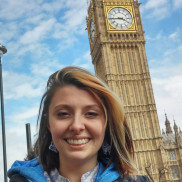Ileah Bodily: Confronting Intolerance in Idaho Classrooms


Ileah Bodily is using the lessons she learned from the TOLI seminar in Billings, Montana to teach her students the power of asking questions, approaching history from multiple perspectives, and the importance of addressing terrible acts, even in the face of your own guilt.
Ileah knew she wanted to be a teacher from a young age. Now, teaching eighth grade social studies at Rigby Middle School in Rigby, Idaho, Ileah encourages her students to ask the question: Why?
“Holocaust and genocide education are courses that raise big questions like, “Why do humans kill other humans?” or, “Why do people hate others?” We can challenge students with these questions because they should be asking themselves, “How could my everyday actions affect these (event ) and big questions?”’
“Teenagers are at a point where they are forming opinions and thoughts that will shape them for the rest of their lives,” she continues. “What could be more important for them than pondering the questions of humanity?”
Ileah was introduced to TOLI through two former participants who teach in her district. They invited Ileah to attend the TOLI seminar in Billings, Montana in 2019.
Although her students are drawn from small communities, there are still some divisions: city and rural, Latinx and white, rich and poor. These differences can sometimes lead to charged moments in the classroom. In the past, Ileah struggled to handle these situations in a way that felt productive. However, she says the seminar gave her the necessary tools, “to confront these everyday acts of intolerance in a way that is an effective lesson, instead of just a knee jerk reaction.”
“Now I know what to do and what to say,” she continues. “It is so wonderful to feel confident that I can handle whatever comes my way.”
Ileah noted that in the past when she had gone to teacher conferences, she had left feeling discouraged. But her experience at TOLI was different.
“I left the Montana seminar feeling like I could do anything! I felt in my heart that I could really make a difference, and that there were teachers all over the world who were fighting the same fight I was. It was incredibly empowering.”
As a teacher in Idaho, Ileah believes it is imperative to address the history of the Native Americans who historically occupied the land she teaches on. The seminar taught her to consider perspectives when teaching this history.
“The seminar gave us many amazing resources to use that give voice to the Native American side of the story, telling it in their own words. This was very powerful.”
Ileah also learned that in order to learn from the past, we must address terrible acts throughout history, even if it means acknowledging our own guilt.
“The temptation with the guilt is to push all of it away… TOLI gave me tools to help with how to teach the facts and the history in a way that confronts the guilt and says, ‘Just because this makes you uncomfortable doesn’t mean this story shouldn’t be told.’”
“In reality I don’t have perfect answers,” she concludes. “I do know that I can encourage [students] to ask questions and give them something tangible they can do. These are things that my students, in their world, can implement to break the cycle.”
